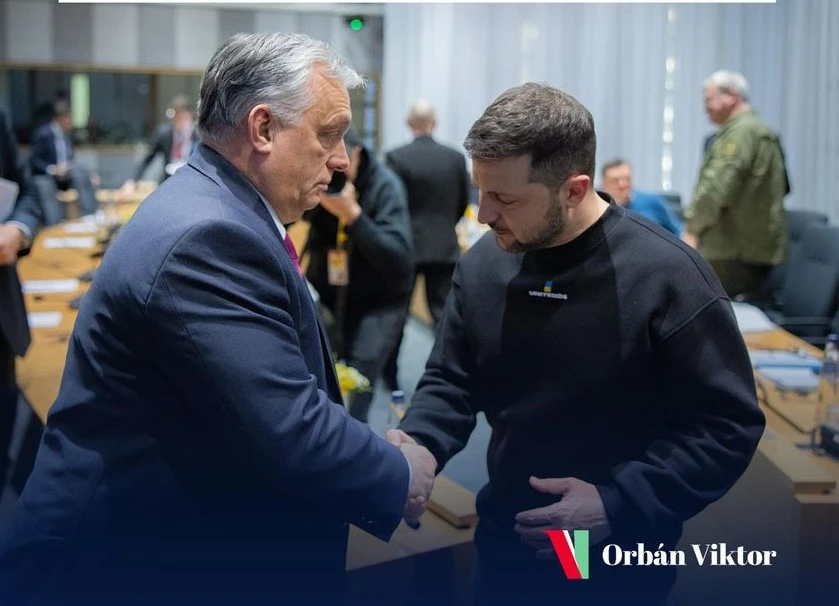The Hungarian government has pushed back on EU measures to send aid to Ukraine on several occasions. While in March and May, the country’s delegation refrained from vetoing the enlargement of the European Peace Facility, the government is now actively blocking payments from reaching Ukraine.
Aid to Ukraine is on hold due to Hungary
One of the European Union’s main instruments to support Ukraine is the so-called European Peace Facility (EPF), which allows for military assistance to non-EU members. The EPF was created in 2021 to finance the EU’s common foreign and security policy, mainly the prevention and management of crises, peacebuilding, and peacekeeping in third countries. Missions financed by the EPF include, for example, peacekeeping in Bosnia and Herzegovina.
At the same time, it is now the fund used to aid arms purchases of the Ukrainian army, with more than EUR 11 billion allocated by member states for assistance – with the latest expansion of the EPF accepted with Hungary abstaining in the vote.
As G7 writes in a recent analysis, EPF aid to Ukraine is currently a matter of great urgency: the intensifying Russian artillery and air offensive is forcing Ukraine to buy more weapons, and since “the overwhelming majority of EU member states consider the survival of Ukraine and the deterrence of Russian aggression to be of vital European security interest,” the implementation of the fund is an important agenda for the union.
This is why the Hungarian government’s latest attempts to block payments are a great political frustration for the bloc. As not only the expansion of the EPF but also the individual payments within it must be unanimously agreed on by member states, Hungary’s refusal to accept the flow of aid to Ukraine has, according to Bloomberg and POLITICO, held back EUR 6.5 billion from reaching the war-torn country.

There is debate and there is what Hungary is doing, writes G7
As G7 points out, there certainly are political debates among EU member states on the extension of the EPF envelope. France, for example, wanted to lobby for the subsidy to apply only to arms purchases from EU firms (this ultimately failed due to the capacity limits of European manufacturing). That said, the magazine highlights, the Hungarian policy towards aid to Ukraine is in a category of its own.
Viktor Orbán’s government has been complicating the work of the EU for several weeks now, and Brussels politicians seem to be getting fed up with the politicking. Lithuanian Foreign Minister Gabrielius Landsbergis, for example, has complained that Hungary is currently blocking 41 percent of draft legislation on Ukraine.
As DNH wrote here, POLITICO talked to three diplomats working in Brussels who suggested that the Hungarian government could lose a significant position within the EU due to its Ukraine policy. Furthermore, Euractiv wrote in an article at the end of May that several politicians are frustrated by Orbán’s government:
“[S]ome EU diplomats have said they see Hungary’s veto actions as a pattern of behaviour that might require a discussion about practical changes to the bloc’s decision-making processes.”
The reasons are not clear, but aid to Ukraine remains on hold
The purpose of the Hungarian government’s actions is not entirely clear even to member state representatives, but, as G7 writes, there are several potential explanations.
As for the government’s official position on the aid to Ukraine:
- The Hungarian government had objected to the designation of OTP bank as a war-supporting company by Ukraine. Since then, the bank has been removed from the blacklist, but nonetheless, Hungary is pushing back on funds being released, now citing negative discrimination against Hungarian companies in Ukraine as a decisive factor for the obstruction.
- Foreign Minister Péter Szijjártó continuously reiterates the official Hungarian position that Brussels is “pro-war” and that the aid will only escalate the war in Ukraine, even leading to the conscription of Hungarian youth.
On the other hand, G7 mentions some other possible explanations for the Hungarian position:
- According to some, the Hungarian government is seeking to unfreeze EU funds blocked by the European Commission over rule-of-law concerns in the country. “By stopping payments (of aid to Ukraine) at lower levels, the prime minister wants to raise the issue to the level of the EU summit and there open up the veto lift to a broader negotiation,” G7 writes.
- The Orbán government may also be hoping to be in a better position to negotiate after the EP elections.
- Furthermore, some say that the time wasted related to EPF payments is a pro-Russian move, as it helps weaken Ukrainian defences.
Read also:
The very last sentence of this article states the truth. Fidesz works for Russia.
Ukraine is a black hole. Even if the aid was not spent on new S.U.V.s for government officials costing literally a half a million dollars each, this is unsustainable. Ukraine is not going to defeat Russia. How many more hundreds of billions of dollars of your and my money will be burned for billionaires’ vanity?!?
Sit down with Russia and figure things out. Lands change hands all the time.
Some shocking statistics- Mr. Putin´s Russia damaged 106 hospitals and clinics, 109 churches, and 708 schools, universities and colleges. “Collateral damage” or targeted?
Weakening Ukraine´s defenses (and let´s face it – they are on the defense!) and enabling Russia´s ongoing attacks is … Well. Our Politicians appear to believe it is “necessary”. So much for any moral high ground or ethical standard!